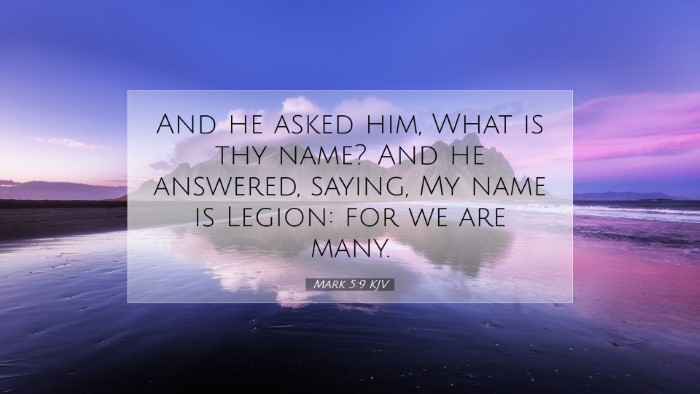Commentary on Mark 5:9
Mark 5:9 states, "And he asked him, What is your name? And he answered, saying, My name is Legion: for we are many." This passage presents a significant moment in the narrative of Jesus' encounter with a demon-possessed man. The response of the demon not only reveals its identity but also signifies the depth of spiritual oppression experienced by the individual.
Historical Context
The setting of this event is Gerasa, a region with a mixed population of Jews and Gentiles. The presence of pigs being reared here indicates a Gentile territory, emphasizing the universality of Christ's mission. This interaction with the demoniac highlights Jesus' authority over unclean spirits and serves as a demonstration of His divine power.
Exegesis and Interpretation
- Identity of the Demonic Entity: The self-identification of the demon as "Legion" holds profound implications. A Roman legion numbered in the thousands, suggesting a multitude of oppressive spirits inhabiting this man. Thus, it symbolizes overwhelming darkness and the man's deep bondage.
- The Question of Identity: Jesus' inquiry, "What is your name?" carries weight. It is not merely an interrogation; it is an act of authoritative engagement. By asking, Jesus draws out the confession of the demonic presence, which is essential for the healing and liberation of the possessed man.
- Spiritual Warfare: This encounter exemplifies a broader theme of spiritual warfare. The identification of the legion indicates the intense conflict between good and evil. It invites reflection on the nature of evil and the authority of Christ to confront and overcome it.
Theological Implications
Mark 5:9 unpacks several theological truths relevant to pastors, theologians, and students:
- Nature of Sin and Evil: The multitude represented by "Legion" illustrates the pervasive nature of sin. Just as the man was tormented and isolated, sin separates humanity from God. Understanding this can deepen our comprehension of the necessity of Christ’s redemptive work.
- Authority of Christ: The authority evident in Jesus’ interaction underscores His superiority over spiritual forces. This ongoing reality encourages believers in spiritual battles, assuring them that no darkness is too great for the light of Christ.
- Restoration and Transformation: The dialogue signifies a step toward liberation. Jesus’ authoritative questioning leads to the name revelation, which is pivotal for the upcoming deliverance, reminding us that acknowledging the problem is integral to healing.
Insights from Public Domain Commentaries
Various commentaries offer rich insights into this passage:
Matthew Henry's Commentary
Henry emphasizes the significance of the dialogue between Jesus and the demon. He notes that the disclosure of the name "Legion" not only conveys the number but also reflects on the power of Christ over the collective evil. He likens this to recognizing and confronting our spiritual battles rather than ignoring them, as awareness is the path towards liberation.
Albert Barnes' Notes
Barnes points to the incredible depth of Jesus’ inquiry. He suggests that the response of "Legion" illustrates the multitude of spirits as one united entity, indicating that the man was entirely overwhelmed by demonic influence. This understanding leads to insight into the collective nature of sin and how individuals can be ensnared by it.
Adam Clarke's Commentary
Clarke elaborates on the social and spiritual intricacies of the encounter. He notes that the spiritual realm often manifests in the physical, shedding light on how the demonic possession affected not just the individual but also the community surrounding him. This commentary serves as a reminder of the far-reaching impacts of spiritual oppression both personally and corporately.
Applications for Contemporary Believers
The rich tapestry of insights from Mark 5:9 urges contemporary readers—whether pastors, students, or scholars—to:
- Engage in Spiritual Discernment: Recognize and confront the spiritual battles in our lives, understanding that awareness of our struggles is the first step towards healing.
- Embrace Christ’s Authority: Draw comfort and strength from the knowledge that Jesus holds supreme authority over every evil force, providing assurance in our spiritual journey.
- Foster Community Healing: Understand that individual struggles with sin and oppression can have broader community implications. Encourage vulnerable conversations within the community to promote collective healing.
Conclusion
Mark 5:9 encapsulates a transformative encounter that underscores Christ's power and authority over the demonic realm. By analyzing the text through various commentaries and theological reflections, we gain profound insights into the nature of sin, the importance of identity, and the overarching nature of spiritual warfare. These truths remain relevant in today's context, calling believers to a deeper understanding of Christ’s redemptive work in confronting both personal and communal oppressions.


